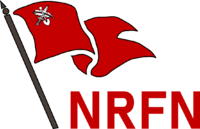Novalian Revolutionary Front
Novalian Revolutionary Front Narodnorevolučionarna Fronta Novalije | |
|---|---|
 | |
| Abbreviation | NRFN |
| General Secretary | Dragan Čović |
| Supreme Council Chairman | Miroslav Škoro |
| Founded | May 14, 1938 |
| Headquarters | 19 Gardijske, Lanište |
| Newspaper | Zemlja |
| Student wing | NRFN Student Associations |
| Youth wing | Novalian Federation of Youth Groups |
| Women's wing | Democratic Women's Leagues |
| Paramilitary wing | Novalian People's Army (dissolved 1990) |
| Membership (2022) | 6,322,421 |
| Ideology | Novalian nationalism United Novalia Democratic socialism Historical: Equalism Tretyakism Revolutionary socialism |
| Political position | Center-left to Left-wing Historical: Far-left |
| National affiliation | April Bloc (in Austeria) YLE (in Piraea) |
| Colors | Red |
| Slogan | "Freedom or Death!" |
| Affiliates | National Cultural Institute |
| Senate of Austeria | 13 / 131
|
| Senate of Etruria | 0 / 810
|
| State Assembly of Novalia | 15 / 200
|
| Piraean Senate | 1 / 125
|
The Novalian Revolutionary Front (NRF), officially the National Revolutionary Front of Novalia (Novalian Narodnorevolučionarna Front Novalije, abbr. NRFN), also known as Fronta (Front), is an Novalian nationalist and socialist political party founded in 1938 in Vilanija, Functionalist Etruria as a unification of various Novalian nationalist groups in response to the Legionary Reaction. Today the party holds seats on the national legislatures of Austeria, Etruria, and Piraea and several regional legislatures.
The NRF originated as a merger of various Novalian political groups following the Functionalist coup d'état in 1938, with the declared goal of achieving "the independence of Etrurian Novalia" by means of armed rebellion. Following initial crackdowns by Etruria, NRF members founded the Novalian People's Army later that year, beginning the party's war against the Etrurian state. Prior to the outbreak of the Solarian War its activities were limited until 1942, when it aligned with Omer Kotta's Austerian Liberation Front. Both forces were able to liberate the majority of Austeria, while the ALF assisted the NRF in establishing armed cells across Novalia that attacked collaborationist and Etrurian security forces. At the end of the war, the Community of Nations agreed to recognize the NRF and the ALF as the legitimate government of Austeria in exchange for the NRF and the ALF ceasing their activities in Etrurian Novalia.
After a brief pause in the fighting, the Novalian People's Army reneged on the deal and resumed attacks against Etrurian authorities, beginning the Western Emergency in Novalia in 1948. Conflict with the Second Piraese Republic in Novalian majority regions erupted shortly thereafter. The Army and the NRF were supported by the South Euclean People's Republic and the Austerian People's Republic. The intensity of the conflict greatly intensified following the 1960 coup, establishing the military dictatorship in Etruria, and the seizure of Tarpeia in 1961. The Novalian People's Army targeted infrastructure and security forces with widespread gun and bomb attacks, although there were attempts to limit civilian casualties. However the Army openly targeted people it viewed as collaborators and their families with kidnapping and assassinations. In response, the Etrurian state indiscriminately targeted those who it believed were sympathetic to the nationalist cause with widespread use of extra-judicial killings, disappearances, torture, and capital punishment. These harsh measures and declining support from SEPR and Austeria were successful in suppressing the Army in Etrurian Novalia.
The Austerian Conflict was a major cause of declining Austerian support, as the government turned its focus to internal security. Tensions between Austeria and the NRF/NPP rose further with the Amathian Revolution and the cessation of all support from SEPR in 1980. Meanwhile the Austerian government grew concerned about the political influence of the NRF and the military power of the NPP and attempted to curtail them. In response, the NRF turned against their former benefactor in 1984 beginning the second phase of the Years of Blood. The conflict intensified throughout the 1980s and began to spill into Etruria which led to a major escalation of tensions. After the reformist factions seized power in the Liberation Front, the Austerian government led by Sotir Godo began dismantling the Equalist system in Austeria, the NRF agreed to peace talks. As part of the Yndyk Agreement in 1988, the Front agreed to disarm and dissolve its armed paramilitary wing, which it completed a year later after it handed over its weapons to the Austerian government. Shortly thereafter, the leadership of the Front dropped its policy of abstentionism and resolved to pursue its political goals through electoral politics. The party participated in the elections under the new socialist democratic system, where it formed as one of the largest opposition groups. Despite its leftist positions, it played a key role in bringing an end to the Austerian People's Republic in the Olive Revolution.
Historically the Front advocated for an armed struggle to create an independent United Novalia under a one-party socialist state where it would serve as the vanguard party. The party abandoned this strategy after the Morwall Agreement and fully embraced perusing its goals through electoral politics. Today, the political party continues to campaign for the formation of a unified Novalia under a multiparty democracy by engaging through the political process. Unlike most other Novalian minority parties present in Euclea, the Front is explicitly secessionist and remains the main driving force of Novalian nationalism. For this reason and its violent history, it remains a controversial party and subject to scrutiny and opposition by the national governments of the countries it operates in.
In 2023, the Front holds seats in three national and several regional legislatures. In Austeria, the party holds 13 seats in the Senate of Austeria as part of the April Bloc in opposition to the ruling government. In Piraea, the party is a member of the Popular Unity Candidacy coalition, where it holds a single seat.